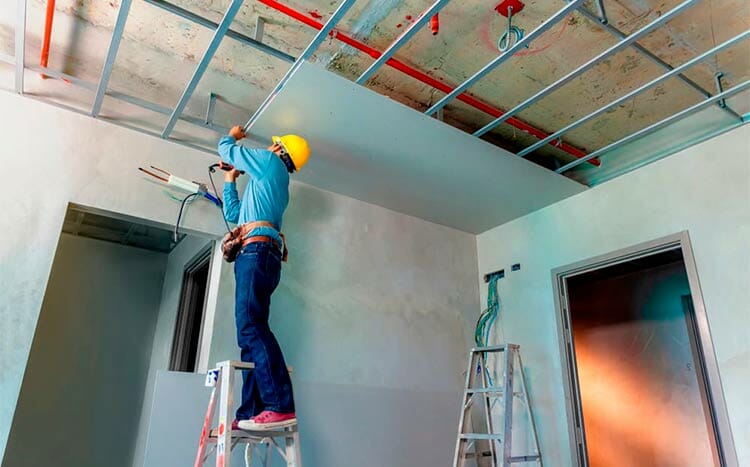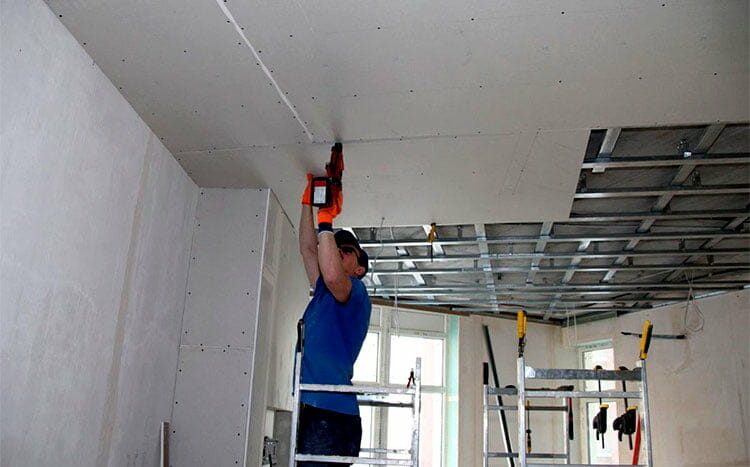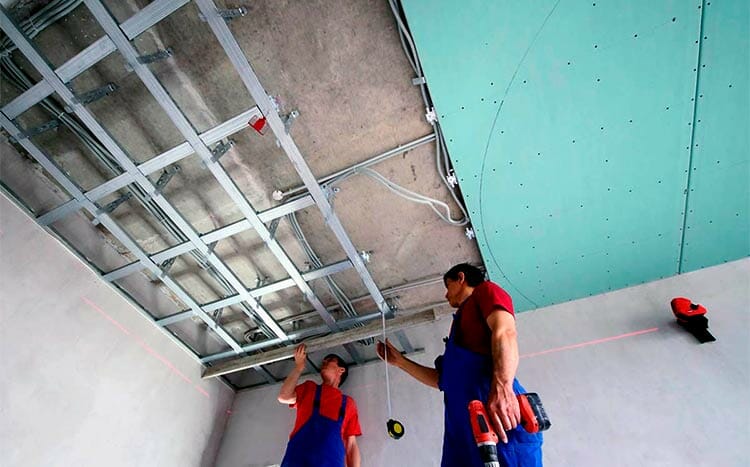Drywall offers an affordable solution for constructing walls and ceilings, however, costs may increase if there’s uncertainty about the appropriate thickness required for your particular requirements.
On average, the cost to hang a ceiling is $2.6 per square foot, with a range of $2.25 to $3 per square foot. For a typical 10 x 12 room ceiling (120 sq. ft.), it will cost $330 on average.
Ceilings are costlier to drywall than walls because they are challenging to hang and finish. Also, some ceilings are more expensive like vaulted and cathedral ceilings because of their height and complexity.

What we cover
ToggleAverage cost to hang ceiling drywall
The following table provides you with a summary of the average cost to drywall a ceiling.
| Services | Quantity | Low | High |
|---|---|---|---|
| Ceiling drywall cost | per sq. ft. | $2.25 | $3 |
| Ceiling drywall cost per room | 10 x 12 room | $270 | $360 |
| Ceiling drywall labor cost | Per hour | $30 | $45 |
| Ceiling drywall on vaulted ceiling | Per sq. ft. | $8 | $18 |
| Suspended Ceiling drywall cost | Per sq. ft. | $1 | $2 |
| Ceiling drywall per sheet cost | sheet | $10 | $35 |
| Ceiling drywall in a Garage cost | Per sq. ft. | $1 | $4 |
| Ceiling drywall cost for 10 x 12 room | 10 x 12 | $270 | $360 |
| Ceiling drywall cost per average 1,500 sq. ft. house | Per sq. ft. | $2.25 | $3 |
Average Estimate: $1,200
Ceiling drywall cost
The average cost to install drywall on a ceiling is about $2.6 per square foot on average, coming in between $2.25 and $3 per square foot. Installing drywall on ceilings is difficult because the panels are heavy and challenging to hang.
This makes this project costlier than installing drywall on walls.
Usually, ultralight 1/2- inch is a great option for DIYers because it is easier to work with. However, it is costlier than standard drywall, meaning you will spend more on your project.
Ceiling drywall cost per room
The cost to install ceiling drywall per room depends on its size, complexity, location, and preferred finish options. In a typical 12 x 12 square foot room, you can pay about $324 to $432 to drywall a ceiling.
Hanging and finishing drywall on the ceiling is complicated, and you cannot do it without a helper or a lifting machine. If you want a professional look, it is best to hire professionals to do the job for you. However, if you want to save on the costs, you can DIY the project as long as you follow all the protective measures.
Ceiling drywall labor cost
Contractors charge about $30 to $45 per hour to drywall a ceiling. Most pros, however, charge the installation cost per square foot and price the project based on how many hours they believe it will take.
When looking for drywall contractors, always choose the ones offering per square foot rates. This way, the project’s cost will not change no matter how many hours it takes unless there are major challenges. Hourly rates may be costly and even unrealistic because the project may take more than a day if it is big.
Ceiling drywall on vaulted ceiling
Vaulted ceilings are very complicated, and they cost a lot more to install than other ceiling types. The average price to install drywall on a vaulted ceiling is approximately $8 to $18 per square foot.
The overall price may vary depending on the steepness of the ceiling. This kind of project is almost impossible to DIY because of its complexity. Also, not all contractors can handle it, meaning you need highly skilled pros for the job. Ensure you see a few examples of a potential contractor’s previous projects to be sure they have the required experience to drywall vaulted ceiling.
Suspended Ceiling drywall cost
Suspended ceilings are not as complicated as vaulted ceilings and are easier to install. If you want to install drywall on a suspended ceiling, expect to pay anything between $1and $2.5 per square foot for the project.
Both drywall and suspended ceilings are cheap, making them good options if you are looking for a cheaper ceiling option. For sophisticated ceilings, beam, coffered and vaulted ceilings are good choices.
Ceiling drywall per sheet cost
The average cost of ceiling drywall is $10 to $35 per square foot. Ultralight drywall is the best to use for DIY projects because they are easy to work with. They are about 13 pounds lighter than standard drywall, making them easy to lift and hang. However, they cost more than standard drywall.
Standard ½-inch drywall is a good option for walls and ceilings, and it costs about $12 to $18 for the 4’ x 8’ thickness and $15 to $24 for the 4’ x 12’ thickness. Larger sheets are great to work with because they have fewer joints, take a shorter time, and the installation cost per square foot will be lower. However, they are difficult to hang, especially for a DIY project.
Ceiling drywall in a Garage cost
Installing drywall on a garage ceiling costs between $1.50 to $4 per square foot, depending on its size and height.
Garage ceilings are usually hidden from public view, and most homeowners skip drywalling them. Some choose to lay plywood or OSB over the ceiling joints to provide more storage room in the garage’s attic. The joints and the underside of the plywood or OSB are then painted.
For a better-looking garage, drywall is an inexpensive yet appealing material to use. Most homeowners’ garages serve more purposes than just protecting their vehicles. For this reason, making the garage appealing is very important.
Ceiling drywall cost for 10 x 12 room
An average 10 x 12 room costs about $270 to $360 to drywall the ceiling. This cost depends on the ceiling’s height, location, and difficulty. You can ask your contractor to use larger sheets because the cost per square foot will be lower. The time for handling the project will also be shorter compared to smaller sheets.
However, if you want to DIY the project, it can be difficult to work with large drywall sheets because they are challenging to lift and hang.
Ceiling drywall cost per average 1,500 sq. ft. house
The cost to install ceiling drywall is between $3,375 and $4,500 on average. The cost for this project per square foot is $2.25 to $3. For a big project like this one, you can use larger drywall panels to lower the costs and time to complete the project.
Best thickness drywall for ceilings
The best thickness drywall for ceilings is 5/8-inch panels. These panels are heavy, fire-resistant, and soundproof, making them an excellent choice for your ceiling. This drywall thickness is also the standard thickness for fire-code and fire-resistant drywall, and it is usually found in garages.
However, since this is the largest thickness for drywall, it can be difficult to DIY the project. . ¼-inch panels are too light for ceilings, making them unsuitable for ceilings. ½” or 3/8” panels are good options, and most people use them on their ceilings. However, they tend to sag downwards between the rafters after some time. So, for a durable, soundproof, and fire-resistant drywall, the 5/8” is the best to choose.
Fire-resistant drywall options for ceilings
Fire-resistant drywall costs about $13 per sheet, and the average installation cost is $416. Fire-rated panels are excellent for ceilings because they offer additional protection to your home. They are very thick, and they are designed using non-combustible fibers.
Type X drywall sheets are mostly used for the kitchen, garage, and commercial buildings where there is a prescribed rating for fire-resistance. Also, in countries where wildfires are prevalent, type X panels are used for walls and ceilings. These panels are thicker and tougher, making them slightly costlier than standard drywall.
Price factors for drywalling a ceiling
Before installing ceiling drywall, it is essential to know the cost factors involved to be prepared. Below are some of the price factors you should know about.
- Ceiling height – standard ceilings of 8 to 12 inches can be installed using stilts, ladders, or drywaller benches and are cheaper than high ceilings. So, if your house has a high ceiling, you will pay more for the installation cost because special equipment like scaffolding will be required.
- Ceiling size – the size of the ceiling also impacts the overall cost of the drywall installation. Larger spaces will cost more, but the installation per square foot will be lower.
- Number of corners – if the room/house has many corners, the overall cost for materials and labor will be more. This is because there will be more cut-outs for the fixtures, leading to wastage of the materials. Also, the installation will take longer.
- Prep needed – if you are drywalling an old ceiling, you may need to prep it first, especially if you are replacing old drywall. You may spend about $1 per square foot for the prep work or you can DIY and cut down the costs.
- Drywall thickness – drywall panels have slight cost differences depending on their thicknesses. So, if you choose the 5/8” drywall, you will spend more money for the installation than using ½” drywall panels.
- Fire-resistant – fire-resistant panels are costlier than standard drywall. So, using these panels means you will pay more for the installation of your ceiling. Also, these panels are difficult to lift and hang, making them challenging for DIY projects.
- Bathroom/kitchen – bathrooms and kitchens and other smaller spaces tend to be costlier to install drywall. Most contractors charge a minimum fee of $200 for such installations, which makes these projects expensive.
- Old drywall removal – removing old drywall may cost about $2 to $4, depending on the room’s size. This cost is inclusive of the demolition and disposal, and it will reflect on the overall installation cost.

DIY supplies cost
For a DIY project, you must have all the supplies necessary to start and finish the installation. Below is a list of all the items you will need.
- Standard drywall panels – $8to $18 per panel
- Moisture-resistant drywall – $12 to $22
- Joint tape – $6 per roll
- Joint compound – $5.50 per gallon
- Drywall screws – $6 per box
- Basic hand tools – $7 each
- Drill/driver – $50
- Drywall lift rental – $45 per day
The materials’ total price will depend on the size of your house and the job’s complexity.
Do you need a permit to install ceiling drywall?
No, you do not need a permit to install drywall on the ceiling of your home. However, since rules and regulations differ from state to state, it is essential to find out your state’s requirements before you start any project. Permits are usually required to ensure the building or installation is done to code.
DIY vs. Hiring a Pro
Drywalling a ceiling is complex, and it requires skilled labor to handle the job. Professionals take lesser time for the installations, and the house will have a better finish than DIY. However, for someone looking to save money, DIY is an excellent choice.
Below are the advantages and disadvantages of both options.
Pro advantages
- The installation will have a professional look.
- You will have peace of mind.
- Pros are skilled and experienced.
- The project will take less time.
Pro disadvantages
- The installation will be costly.
- Your vision may not be actualized.
- You will not have control over the project.
DIY advantages
- You will feel fulfilled and accomplished.
- You can actualize your vision.
- You will have total control over your project.
DIY disadvantages
- Risk of accidents and injuries
- The project will last for a longer time.
- The installation will not have a professional look.
Drywall installation is challenging, especially for ceilings, because the panels are heavy and difficult to hang. However, with highly skilled pros, your project will be in good hands. Also, DIYing the project is possible, and you will spend less money as long as you know how to install the panels.













